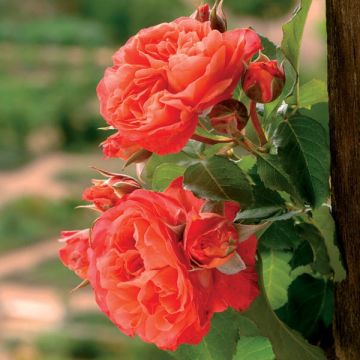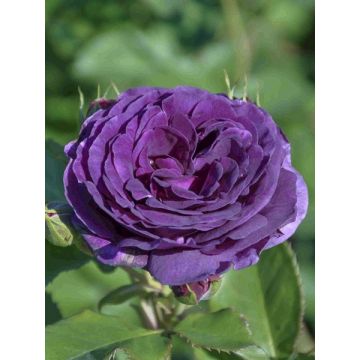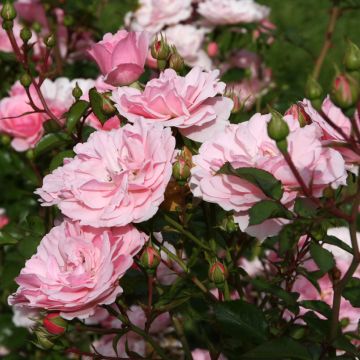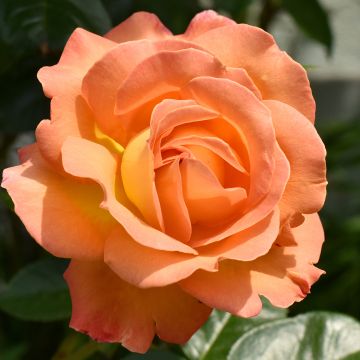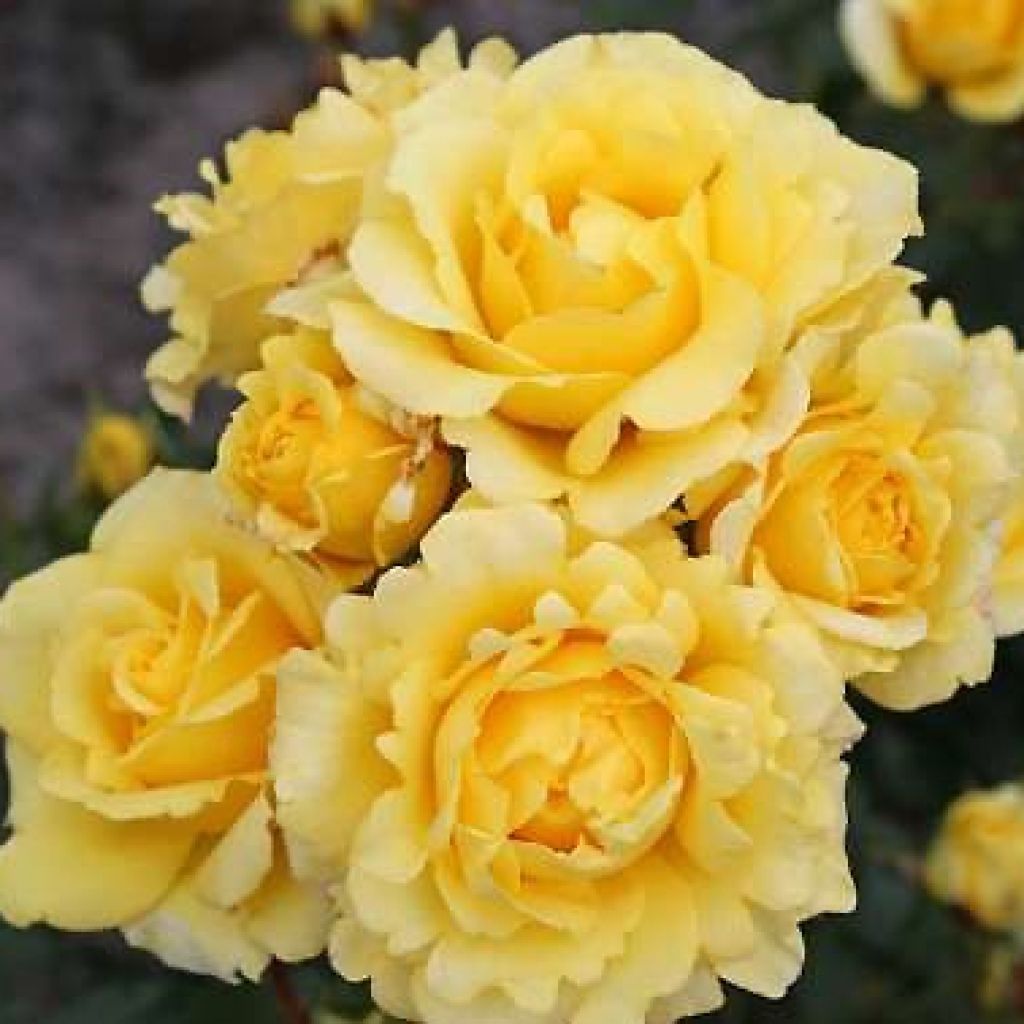

rosier Urban Streetlight Sunmaid
Rosa x polyantha Urban Streetlight Sunmaid - Groundcover Shrub Rose
Rosa x polyantha Urban Streetlight® Sunmaid® 'KORsanhewes'
Rose
Thank you to the team (for order preparation and shipping), the rose bush I received looks healthy. Planted in the ground, close to the "Friesia" variety, I am now patiently waiting for it to take root... or not?
Thierry, 03/10/2024
Special offer!
Receive a €20 voucher for any order over €90 (excluding delivery costs, credit notes, and plastic-free options)!
1- Add your favorite plants to your cart.
2- Once you have reached €90, confirm your order (you can even choose the delivery date!).
3- As soon as your order is shipped, you will receive an email containing your voucher code, valid for 3 months (90 days).
Your voucher is unique and can only be used once, for any order with a minimum value of €20, excluding delivery costs.
Can be combined with other current offers, non-divisible and non-refundable.
Home or relay delivery (depending on size and destination)
Schedule delivery date,
and select date in basket
This plant carries a 6 months recovery warranty
More information
We guarantee the quality of our plants for a full growing cycle, and will replace at our expense any plant that fails to recover under normal climatic and planting conditions.

Description
The Urban Streetlight 'Sunmaid' rose bush is an excellent variety of landscape rose bush that is both robust, highly disease-resistant, very floriferous, and full of good cheer. Its small double roses in shades of sun yellow succeed each other for months on an elegant dark green foliage that is not disfigured by rose diseases. This rose bush requires little attention and care from the gardener, even for beginners, and adapts to many climates. It works wonders in front of taller shrub beds, in large borders along pathways... This variety is an excellent alternative to the more disease-prone Friesia rose bush.
The flowers of Rosa x polyantha Sunmaid, gathered in terminal clusters, come from the polyantha rose bush, an old hybrid derived from Rosa multiflora and R. sinensis. This variety was introduced in 2020 by the German rose grower Kordes, and it obtained the highly selective German ADR label in 2018. It is part of a series of roses developed in partnership with 'Globe Planter', the 'Urban Streetlight' series, bringing together varieties selected for their disease resistance, robustness, and ability to bloom enthusiastically without requiring much maintenance. These plants are widely used in urban landscaping.
This small, well-behaved bush has a rather upright habit. It will reach approximately 70 cm (28in) in height with a spread of 50 cm (20in) in a few years. The 6-7 cm (2-3in) flowers, with a double structure, are gathered in clusters and produced abundantly and regularly from June to October if the soil remains moist. In this Sunmaid variety, the floral buds of a very warm yellow open into yellow-shaded corollas. The flowers have a very light fragrance. This variety is highly disease-resistant and develops an elegant, well-furnished foliage with a shiny dark green colour. Its stems are thorny, and the plant is leafless in winter.
The 'Urban Streetlight Sunmaid' rose bush adapts to all soils that are not too dry and all climates, which allows it to be welcomed in many regions. It works wonders as a border, in a flower bed, in a planter on the patio, or on a large slope where it will conceal and retain the soil. It can also be planted in groups of three specimens, arranged in a triangle, isolated on a lawn. Plant it en masse or alongside white groundcover roses (Swany, Marie Pavie) to emphasise the layout of a pathway or the beds of light or opulent shrubs and perennials. For example, it can be paired with perennial geraniums (Geranium Blue Cloud, Anne Folkard, Nimbus, Orion), bellflowers (lactiflora, rapunculoides), catmints, foxgloves, or other perennial salvias.
Report an error about the product description
Plant habit
Flowering
Foliage
Botanical data
Rosa
x polyantha
Urban Streetlight® Sunmaid® 'KORsanhewes'
Rosaceae
Rose
Cultivar or hybrid
Planting and care
Roses prefer a sunny position (at least 4 to 5 hours of sun per day), but sheltered from the scorching midday rays and strong winds. Roses appreciate loose, permeable soils rich in humus. They prefer a slightly acidic soil but will adapt to any garden as long as the soil is well worked and sufficiently rich. To plant your rose in a pot, work the soil to a depth of 25 cm (10in), crumbling the soil and adding a bottom amendment such as bonemeal. Position your plant, removed from its pot, covering the top of the root ball with 3 cm (1in) of soil. Fill in and water generously to eliminate air pockets. In dry weather, it is necessary to water regularly for a few weeks to encourage root development. Remember to apply special rose fertiliser to stimulate flowering of the plants.
Planting period
Intended location
Care
-
, onOrder confirmed
Reply from on Promesse de fleurs
Similar products
Haven't found what you were looking for?
Hardiness is the lowest winter temperature a plant can endure without suffering serious damage or even dying. However, hardiness is affected by location (a sheltered area, such as a patio), protection (winter cover) and soil type (hardiness is improved by well-drained soil).

Photo Sharing Terms & Conditions
In order to encourage gardeners to interact and share their experiences, Promesse de fleurs offers various media enabling content to be uploaded onto its Site - in particular via the ‘Photo sharing’ module.
The User agrees to refrain from:
- Posting any content that is illegal, prejudicial, insulting, racist, inciteful to hatred, revisionist, contrary to public decency, that infringes on privacy or on the privacy rights of third parties, in particular the publicity rights of persons and goods, intellectual property rights, or the right to privacy.
- Submitting content on behalf of a third party;
- Impersonate the identity of a third party and/or publish any personal information about a third party;
In general, the User undertakes to refrain from any unethical behaviour.
All Content (in particular text, comments, files, images, photos, videos, creative works, etc.), which may be subject to property or intellectual property rights, image or other private rights, shall remain the property of the User, subject to the limited rights granted by the terms of the licence granted by Promesse de fleurs as stated below. Users are at liberty to publish or not to publish such Content on the Site, notably via the ‘Photo Sharing’ facility, and accept that this Content shall be made public and freely accessible, notably on the Internet.
Users further acknowledge, undertake to have ,and guarantee that they hold all necessary rights and permissions to publish such material on the Site, in particular with regard to the legislation in force pertaining to any privacy, property, intellectual property, image, or contractual rights, or rights of any other nature. By publishing such Content on the Site, Users acknowledge accepting full liability as publishers of the Content within the meaning of the law, and grant Promesse de fleurs, free of charge, an inclusive, worldwide licence for the said Content for the entire duration of its publication, including all reproduction, representation, up/downloading, displaying, performing, transmission, and storage rights.
Users also grant permission for their name to be linked to the Content and accept that this link may not always be made available.
By engaging in posting material, Users consent to their Content becoming automatically accessible on the Internet, in particular on other sites and/or blogs and/or web pages of the Promesse de fleurs site, including in particular social pages and the Promesse de fleurs catalogue.
Users may secure the removal of entrusted content free of charge by issuing a simple request via our contact form.
The flowering period indicated on our website applies to countries and regions located in USDA zone 8 (France, the United Kingdom, Ireland, the Netherlands, etc.)
It will vary according to where you live:
- In zones 9 to 10 (Italy, Spain, Greece, etc.), flowering will occur about 2 to 4 weeks earlier.
- In zones 6 to 7 (Germany, Poland, Slovenia, and lower mountainous regions), flowering will be delayed by 2 to 3 weeks.
- In zone 5 (Central Europe, Scandinavia), blooming will be delayed by 3 to 5 weeks.
In temperate climates, pruning of spring-flowering shrubs (forsythia, spireas, etc.) should be done just after flowering.
Pruning of summer-flowering shrubs (Indian Lilac, Perovskia, etc.) can be done in winter or spring.
In cold regions as well as with frost-sensitive plants, avoid pruning too early when severe frosts may still occur.
The planting period indicated on our website applies to countries and regions located in USDA zone 8 (France, United Kingdom, Ireland, Netherlands).
It will vary according to where you live:
- In Mediterranean zones (Marseille, Madrid, Milan, etc.), autumn and winter are the best planting periods.
- In continental zones (Strasbourg, Munich, Vienna, etc.), delay planting by 2 to 3 weeks in spring and bring it forward by 2 to 4 weeks in autumn.
- In mountainous regions (the Alps, Pyrenees, Carpathians, etc.), it is best to plant in late spring (May-June) or late summer (August-September).
The harvesting period indicated on our website applies to countries and regions in USDA zone 8 (France, England, Ireland, the Netherlands).
In colder areas (Scandinavia, Poland, Austria...) fruit and vegetable harvests are likely to be delayed by 3-4 weeks.
In warmer areas (Italy, Spain, Greece, etc.), harvesting will probably take place earlier, depending on weather conditions.
The sowing periods indicated on our website apply to countries and regions within USDA Zone 8 (France, UK, Ireland, Netherlands).
In colder areas (Scandinavia, Poland, Austria...), delay any outdoor sowing by 3-4 weeks, or sow under glass.
In warmer climes (Italy, Spain, Greece, etc.), bring outdoor sowing forward by a few weeks.

































